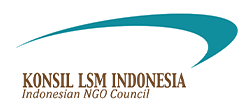The discourse about Civil Society Organisations (CSO), has been the headline in Indonesian’s media recently. The discourse was started when there was a clash between the Islamic Defenders Front (FPI) and the Indonesia Grassroots Movement NGO (LSM GMBI) in Bandung last week. After that, it became known that the West Java Police Chief is an advisory for LSM GMBI.
After that FPI demonstrated for the dismissal of West Java Police Chief because his advisory position was seen as taking sides. Realistically, this happened because the West Java Police Chief was considered to be having a conflict of interest by protecting LSM GMBI, related to recent cases.
Attached the News : Polisi ‘Jalin Simbiosis Mutualisme’ dengan Ormas
In this situation the first principle of “Non-Government” in the NGO Codes of Ethics Konsil LSM Indonesia (Indonesia NGO Council),is relevant.. The Non-Government Principle explains membership of Government officials should not be not more than 30% of the total Board. Meanwhile for the executive director and NGO staff that receive the regular salary / remuneration can’t do the double position as being the government official as well. The basic consideration is, the double position will generate a conflict of interest, but for Board this impact is limited because Board members aren’t involved come to the office day by day.
From the cases that been explained briefly in the first paragraph, the information of that cases only see the perspective how the ‘law-officer’ shouldn’t involved in the NGO organisations structure. However, there isn’t any available information that describes organisations structure of that NGO.
From the NGO perspective, the non-government principle is one of the key values for NGO to implement the democracy. As one of the democracy pillars, NGO ideally has the function in balancing the government and private sector. Implementation of this standard will show the robust and dynamic existence of NGO in implementing the NGO Accountability.
This case implicate that the non-government principle has to be implemented seriously to demonstrate good governance of an NGO. If the NGO Community is doing this consistently and also for other six minimum accountability standards, the support, trust and legitimacy to the NGO will be stronger. So it is a good way to implement Konsil’s vision for building the robust and dynamic existence for NGOs.
Pembicaraan mengenai Organisasi Kemasyarakatan (Ormas), akhir-akhir ini menghiasi media di Indonesia. Hal ini berawal dari kejadian bentroknya FPI dan LSM GMBI. Setelah itu juga diketahui bahwa Kapolda Jawa Barat menjadi Pembina di LSM GMBI.
Setelah hal tersebut terjadi demonstrasi yang menuntut untuk menurunkan Kapolda Jawa Barat karena posisinya sebagai Pembina di LSM GMBI dianggap memihak. Hal ini tentu terjadi karena dianggap memiliki konflik kepentingan untuk melindungi LSM GMBI, terutama dari adanya kasus terkait.
Terlampir beritanya di : Polisi ‘Jalin Simbiosis Mutualisme’ dengan Ormas
Dalam hal ini menurut Kode Etik Konsil LSM Indonesia, prinsip pertama yaitu mengenai Non-Pemerintah. Prinsip Non-Pemerintah menjelaskan bahwa Anggota Pengurus (Board) yang berasal dari aparatur sipil negara (ASN) tidak boleh melebihi 30%. Sementara bagi direktur eksekutif dan staf tetap yang menerima gaji/imbalan secara teratur tidak boleh merangkap sebagai aparatur sipil negara. Dasar pemikirannya adalah rangkap jabatan antar staf LSM dan staf pemerintah (full time) akan menimbulkan konflik kepentingan yang besar, sementara bagi Board dibatasi dikarenakan Board tidak wajib hadir setiap hari di LSM.
Dalam kasus yang diatas, informasi-informasi yang tersedia lebih kepada perspektif sebagai aparat hukum seharusnya tidak terlibat dalam stuktur organisasi LSM. Namun tidak ada informasi lebih lengkap bagaimana stuktur organisasi secara lengkap dalam LSM tersebut.
Dari perspektif LSM prinsip non-pemerintah menjadi salah satu standar dasar bagi LSM berdasarkan keyakinan bahwa LSM sebagai salah satu pilar utama demokrasi idealnya dapat berfungsi menjadi penyeimbang pemerintah dan sektor swasta. Menerapkan standar ini menunjukan bagaimana wujud LSM yang sehat untuk mencapai akuntabilitas LSM.
Kejadian ini menunjukan bahwa prinsip non-pemerintah harus betul-betul diterapkan untuk menunjukan tata kelola yang baik bagi LSM. Jika hal ini dilakukan secara konsisten dan juga sejalan dengan enam standar minimal akuntabilitas lainnya, kepercayaan, dukungan dan legitimasi kepada LSM akan semakin kuat. Sehingga sebagaimana cita-cita Konsil LSM yaitu terwujudnya LSM yang sehat dan kuat.

